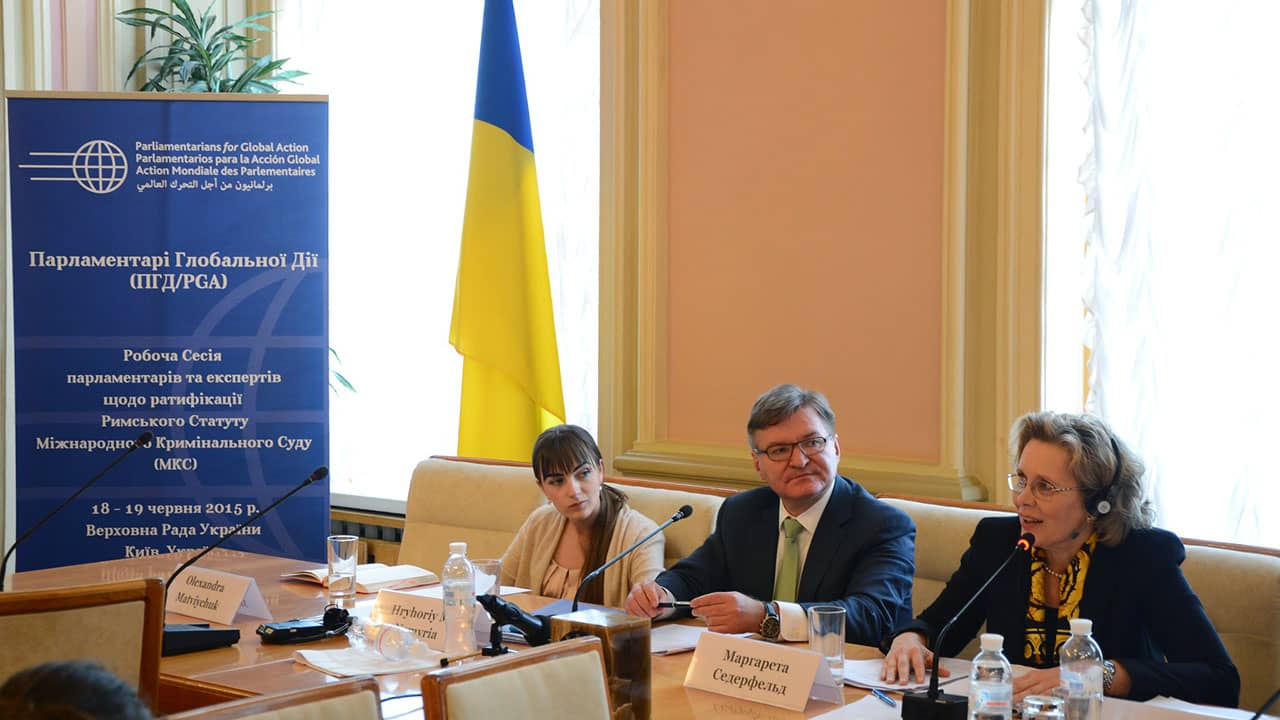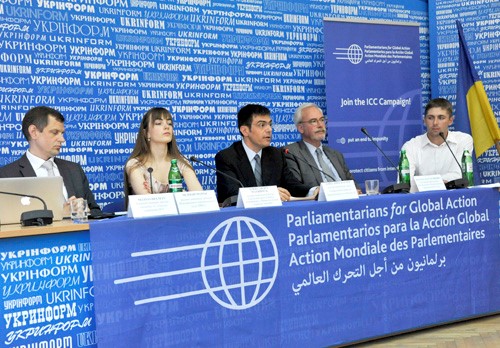
Kyiv / The Hague / New York
Are further delays in ratification of the Rome Statute presenting a lost opportunity to provide for justice in Ukraine? Can Rome Statute ratification in fact help the high-level peace negotiations? Will the ICC replace national Ukrainian courts? These and other concerns were part of the first day of Round-table discussions about the ICC, which are live-streamed on the parliamentary channel and will become available via the website of the Rada. The Roundtable discussions will be resumed in the afternoon of Friday 19 June.
In the context of Ukraine’s current constitutional reform process, PGA is organizing Round-Table working sessions on the International Criminal Court (ICC) on 18 and 19 June 2015 in Kyiv. The Round-Table working sessions are hosted by the Chair of the Human Rights Committee, Mr. Nemyria MP, one of PGA’s 15 members in the Parliament of Ukraine. These informal sessions aim at an exchange of information amongst parliamentarians on current developments, challenges and concerns around the ratification of the Rome Statute by Ukraine. Using the format of informal round-table discussions, experts from the ICC and other entities will interact with Parliamentarians in order to address technical aspects related the substantive and procedural issues of the Rome Statute and its implementation at the national level. Parliamentarians from different countries will share their experiences with the International Criminal Court and the implementation of the Rome Statute.
We truthfully hope that this week's Round-table sessions on the ICC will bring further progress towards the ratification of the Rome Statute. This type of interactive meetings provide useful opportunities to exchange ideas and lessons-learnt and to inform parliamentarians about the mandate of the Court and the technical and political benefits stemming from ratification. The prompt ratification of the Rome Statue by Ukraine is key for bringing an end to impunity in Ukraine, a step that is much needed in the context of the difficult situation in the country. Statement by PGA Member, Helmut Scholz (MEP, Germany)

Panelists Mr. Musiyaka, Deputy Chair of the Constitutional Commission of Ukraine, behind him Mr. Hellman, ICC Presidency External Relations Adviser, Mr. Scholz, MEP, Permanent Representative of The Netherlands to the ICC and OPCW, Mr. Van Hoorn and Ms. Zhytnik, Deputy Head of legal expertise of the Secretariat of the Constitutional Court (Picture: Mr. Mirny, Human Rights Information Center)
The current so-called Article 12.3 Declaration lodged by Ukraine on 17 April 2014, providing the Court with ad hoc jurisdiction in Ukraine to do a preliminary investigation of crimes committed between November 2013 and February 2014, has not yet been followed by the ratification of the Rome Statute, hence maintaining the pre-existing status quo of Ukraine as a non-member of the ICC system. Becoming the 124th State Party to the Rome Statute would allow Ukraine to grant its citizens with the protections of future unrestricted jurisdiction of the Court, and would give Ukraine the opportunity to shape the future of the ICC as equal partners to the other 123 State Parties, including all 28 EU Member States. The prospective jurisdiction of the ICC on crimes that would allegedly be committed in all territories falling under Ukraine’s sovereignty under International Law is perfectly compatible with, and would strengthen the concrete application of, the provisions of the ‘Minsk 2 Peace Agreement’.
Due to the violence and crisis time in Ukraine, the prompt ratification of Ukraine to the Rome Statute is crucial for bringing impunity to an end in Ukraine, strengthening the Rule of Law and building the necessary conditions for solid and durable peace. The Verkhova Rada of Ukraine has made significant progress by making a declaration under Article 12.3 and accepting the ICC’s jurisdiction from 27 February 2014 onwards. It is of utmost importance that Ukraine takes this very important step, ratifying the Rome Statute, as way to demonstrate that Ukraine is committed to strengthening the international criminal law system. Statement by PGA Member Margareta Cederfelt (MP, Sweden)

Mr. Nemyria, Chair of the Human Rights Group and host of the PGA Roundtable discussions and Ms. Cederfelt, MP, PGA Treasurer (Picture: Mr. Mirny, Human Rights Information Center
This week’s Working Sessions on the ICC seek to contribute to address the misinformation and politicization about the Court in certain Ukrainian media: The Court is an independent and impartial body, which is bound only to the application of the law, regardless of the political motivations of relevant actors and stakeholders. The crimes upon which the ICC can exercise jurisdiction over are: 1) Genocide, 2) Crimes against Humanity and 3) War Crimes. The Crime of Aggression, which is often referred to as relevant to the Ukrainian situation, is not yet part of the jurisdiction of the Court, given that its definition and the way in which the Court can exercise jurisdiction over it were only adopted in June 2010. However, through the prompt ratification of the amended Rome Statute, Ukraine can effectively and pro-actively contribute to the activation of the ICC jurisdiction on the crime of aggression, by joining the group of States that have already ratified them. Indeed, the activation of the jurisdiction of the Court over the Crime of Aggression will only be made possible after the ratification of the Kampala amendments by a minimum of 30 States and a decision of the Assembly of States Parties, which cannot take place before 2017.
The PGA Working Sessions on the ICC are organized during the preparatory phase of legislative reform in Ukraine. The first constitutional amendments shall be considered by the Rada by the end of June. Article 124 of the Constitution of Ukraine on judicial sovereignty has been identified as the only constitutional obstacle for the ratification of the Rome Statute and remains a very important, yet sensitive issue, for the Ukrainian Government due to the existing conflict with separatists in the Eastern parts of the country. Hence, the importance of conducting this week’s Round-table sessions.
In April 2015, PGA organized a field mission in Kyiv to bolster support for the ratification process of the Rome Statute in Ukraine and to engage with Members of the newly elected Verkhovna Rada (Ukraine Parliament). PGA met with relevant stakeholders, especially actors involved in the Constitutional reform process that may be instrumental to ratification. In September 2014, PGA facilitated a visit to The Hague by a small delegation of members of Parliament of Ukraine, in order to visit The International Criminal Court.
Ukraine has signed the Rome Statute on 20 January 2000 and ratified the Agreement on the Privileges and Immunities of the International Criminal Court on 29 January 2007, becoming the first non-State Party to accede to the latter Agreement. Upon receipt of the declaration made on 17 April 2014 by Ukraine pursuant to Article 12(3) of the Rome Statute, the Office of the Prosecutor opened a preliminary examination into the situation in Ukraine, focused on alleged crimes committed from 21 November 2013 to 22 February 2014, in order to establish whether the Rome Statute criteria for opening an investigation could be met. On 4 February 2015, the Parliament of Ukraine passed a resolution with 271 votes in favor, calling for a new Article 12.3 Declaration accepting the ICC jurisdiction from 27 February 2014 onwards. This resolution sought to widen the scope of the previous declaration. However, only the Executive can take action in this domain and it did not follow through with the resolution.
The Parliament of Ukraine has thus already unequivocally expressed its commitment to the fight against impunity. However, a declaration made under Article 12.3 may not have the same impact (and benefits) of becoming a state party to the Rome Statute. Indeed, as a state party to the Rome Statute, Ukraine will not depend on having to make ad hoc declarations (for which there needs to be political will), the ICC will have jurisdiction over all relevant crimes allegedly committed in the territory of Ukraine or by its nationals. Most importantly, Ukraine will benefit from the deterrence effect associated to being a state party to the Rome Statute. For all these reasons, Ukraine should ratify the Rome Statute and PGA continues to offer its full support for the achievement of this goal.
Statement by PGA Member, Ana Gomes (MEP, Portugal): “The legal system of Ukraine must reflect the current developments of international law in the fields of human rights and the fight against impunity. The International Community as a whole, including the EU, shall spare no effort to support the different voices of legislators, members of the ICC, academia and NGOs who support peace and justice as interdependent values and goals. Inspired by the leadership-efforts of the Members of Parliamentarians for Global Action in Ukraine, we stand ready to support finding the best and most efficient strategy for the prompt ratification of the Rome Statute of the ICC.”
Members of PGA have contributed to 76 of the 123 ratifications of, or accession to the Rome Statute to date. PGA is a member of the Steering Committee of the Coalition for the ICC.
The PGA Campaign for the Universality and Effectiveness of the Rome Statute system receives support from:
the European Union (European Instrument for Democracy and Human Rights)

The Governments of Switzerland, Liechtenste, Estonia and the Netherlands
![]()
PGA receives core support from the Governments of Sweden and Denmark.
This Event was organized in Partnership with the Human Rights Agenda

and The Razumkov Center

